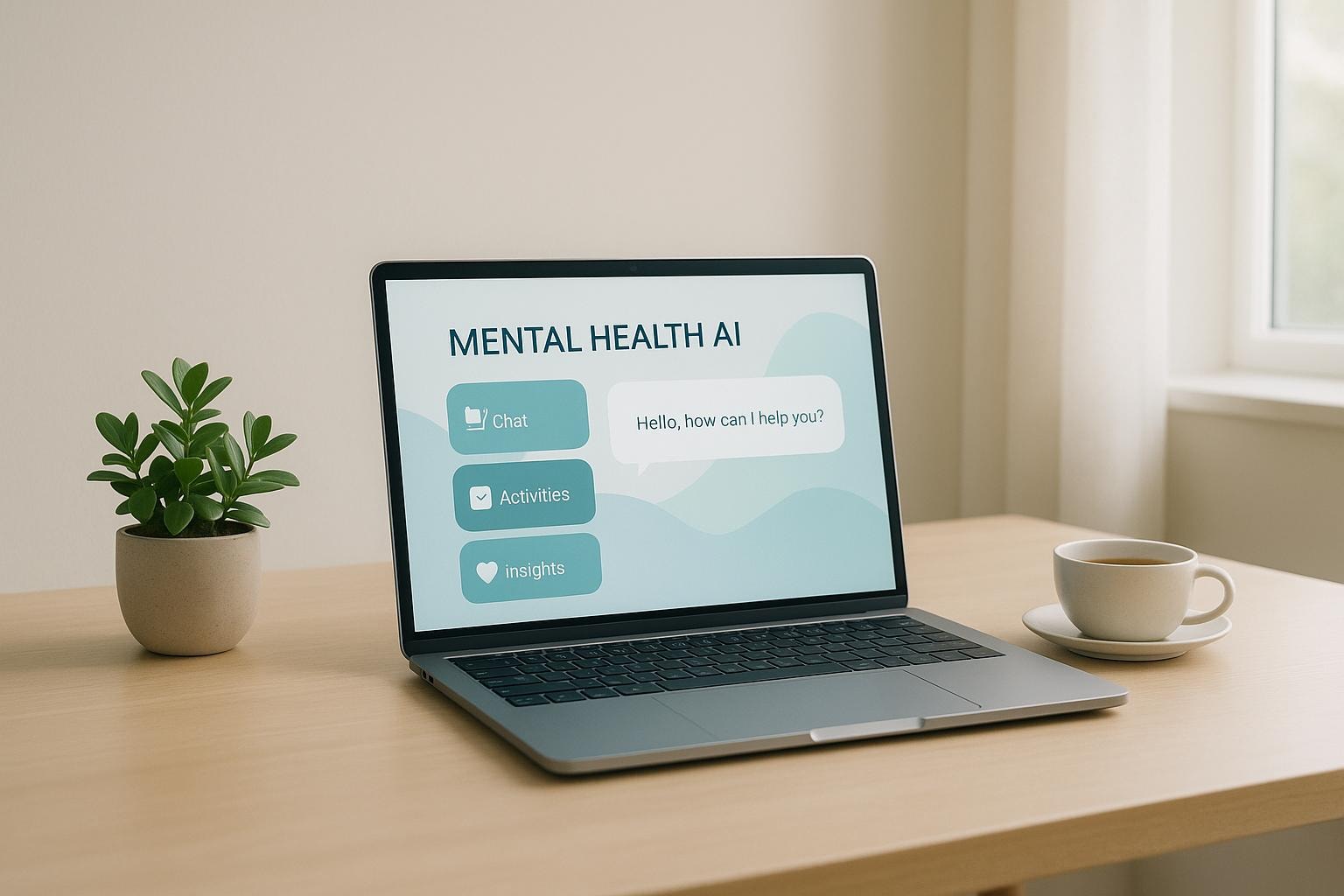
Best AI Tools for Mental Health Support in 2025
Find proven AI tools that improve treatment outcomes by 42% while cutting costs 90% for providers and patients.

Written by
Adam Stewart
Key Points
- Hybrid AI-human models boost recovery rates by 25%
- Smart call systems cut administrative costs 90%
- Choose clinically proven tools over basic wellness apps
- Provider workflow tools help solve therapist shortages
AI tools are transforming mental health care in 2025 by providing accessible, 24/7 support and improving early detection of issues. They also help therapists save time by automating administrative tasks. Here’s a quick breakdown of the top tools:
- Wysa: Combines AI-based CBT guidance with optional human therapist support. Starts at $19.99/month.
- Talkspace: Matches users with licensed therapists using AI. Offers text and video therapy but is pricier.
- Therabot: Focuses on structured CBT exercises via chatbot. Affordable but lacks human therapist access.
- Limbic Care: Improves therapy attendance and recovery rates, primarily used in Europe.
- Dialzara: Automates admin tasks for providers, reducing costs and improving efficiency.
Each tool offers unique features, from emotional support to operational assistance, catering to diverse needs. While AI enhances accessibility, it complements rather than replaces human care. Data privacy and clinical validation remain key considerations.
Top AI Tools for Mental Health Support
In 2025, AI tools are reshaping mental health care by addressing both patient needs and the operational challenges faced by providers. Each tool offers distinct benefits, from direct emotional support to streamlining administrative tasks. Here’s a closer look at some of the leading tools making an impact this year.
Wysa

Wysa blends AI-driven emotional support with access to human therapists, offering a hybrid approach that combines instant assistance with professional coaching when needed. The platform uses clinically validated AI to analyze user responses and provide immediate care, while human coaches step in for more personalized support.
The AI chatbot is available 24/7 and provides evidence-based Cognitive Behavioral Therapy (CBT) guidance. Users can also access tools like mood trackers, guided meditations, and tailored coping strategies.
Pricing: Starts at $19.99 per month, with an annual plan available for $99.99.
Pros: Always accessible, rooted in clinical research, smooth transition to human therapists, and more affordable than traditional therapy.
Cons: Limited depth compared to in-person therapy and not ideal for severe mental health issues requiring intensive care.
Talkspace
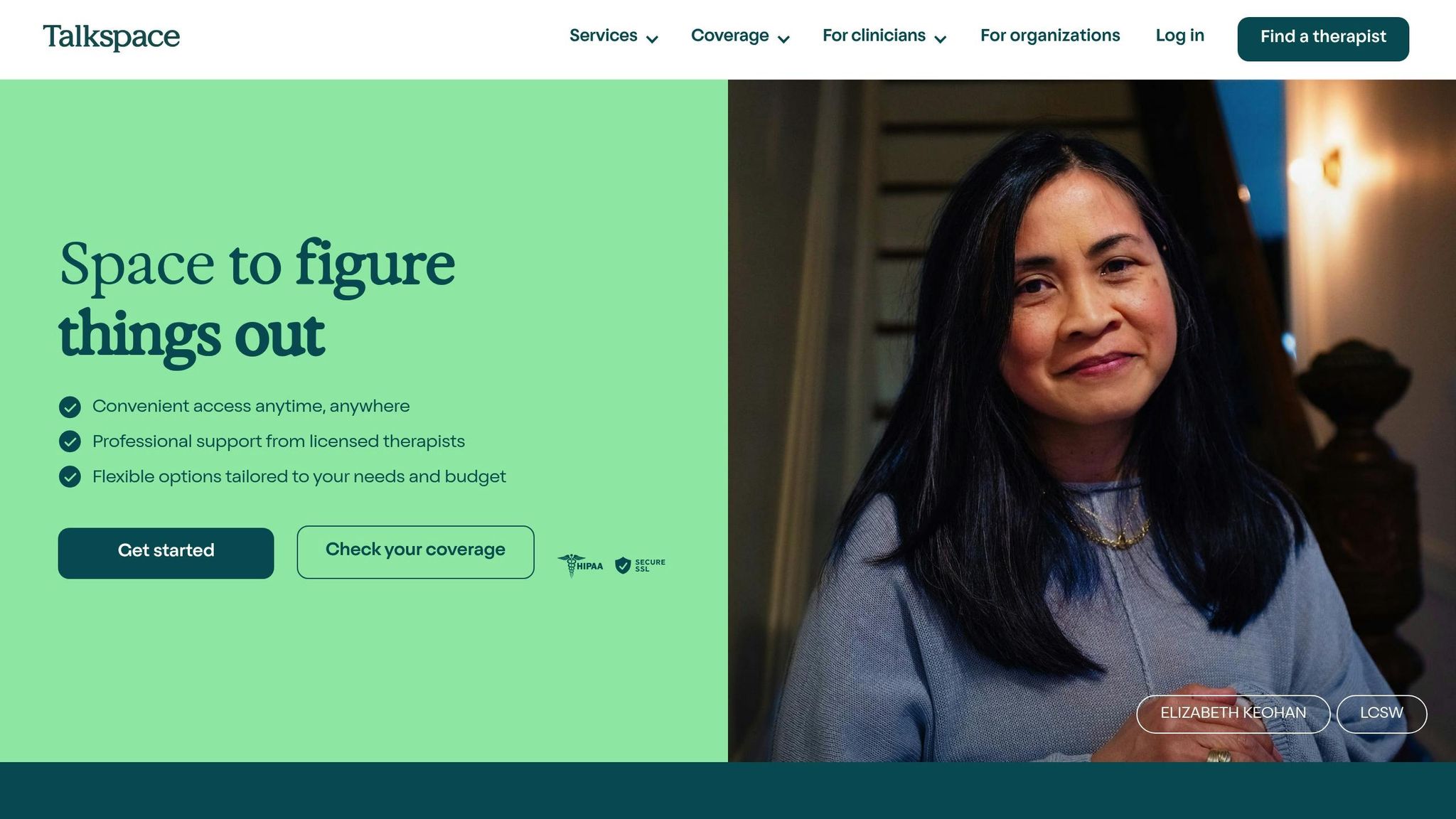
Talkspace integrates AI with licensed therapy to enhance the user experience. Its AI tools, developed in collaboration with clinicians, help match users with the right therapists and treatment plans. The platform analyzes user responses to offer tailored therapy recommendations while maintaining human oversight.
As Minkyung Chung, MS, LMHC, a Talkspace therapist, explains:
"AI in mental health aids with session notes, resource provision, and streamlines workflows".
Pros: Access to licensed therapists, AI-powered matching, a variety of treatment options, and insurance coverage.
Cons: Higher costs compared to AI-only platforms, possible wait times for therapist availability, and ongoing subscription requirements.
Therabot
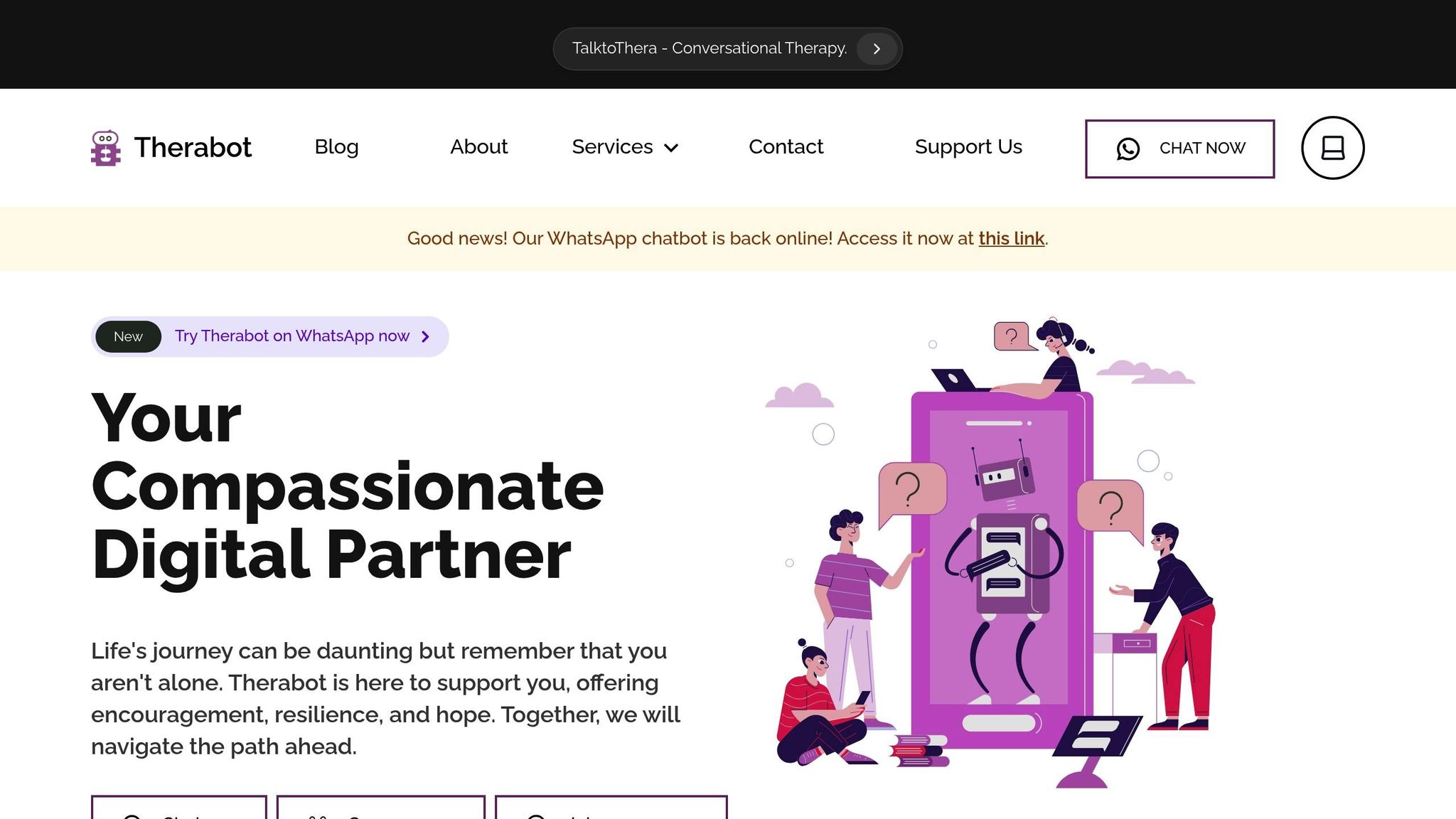
Therabot focuses on delivering structured CBT exercises through an AI chatbot interface. Designed to support users dealing with anxiety and depression, it offers evidence-based techniques like thought challenging and behavioral activation. The platform also includes mood tracking and personalized recommendations based on user engagement.
Pros: Cost-effective, structured CBT program, evidence-based techniques, and progress tracking features.
Cons: Limited to CBT methods without human therapist support and may feel repetitive over time.
Limbic Care
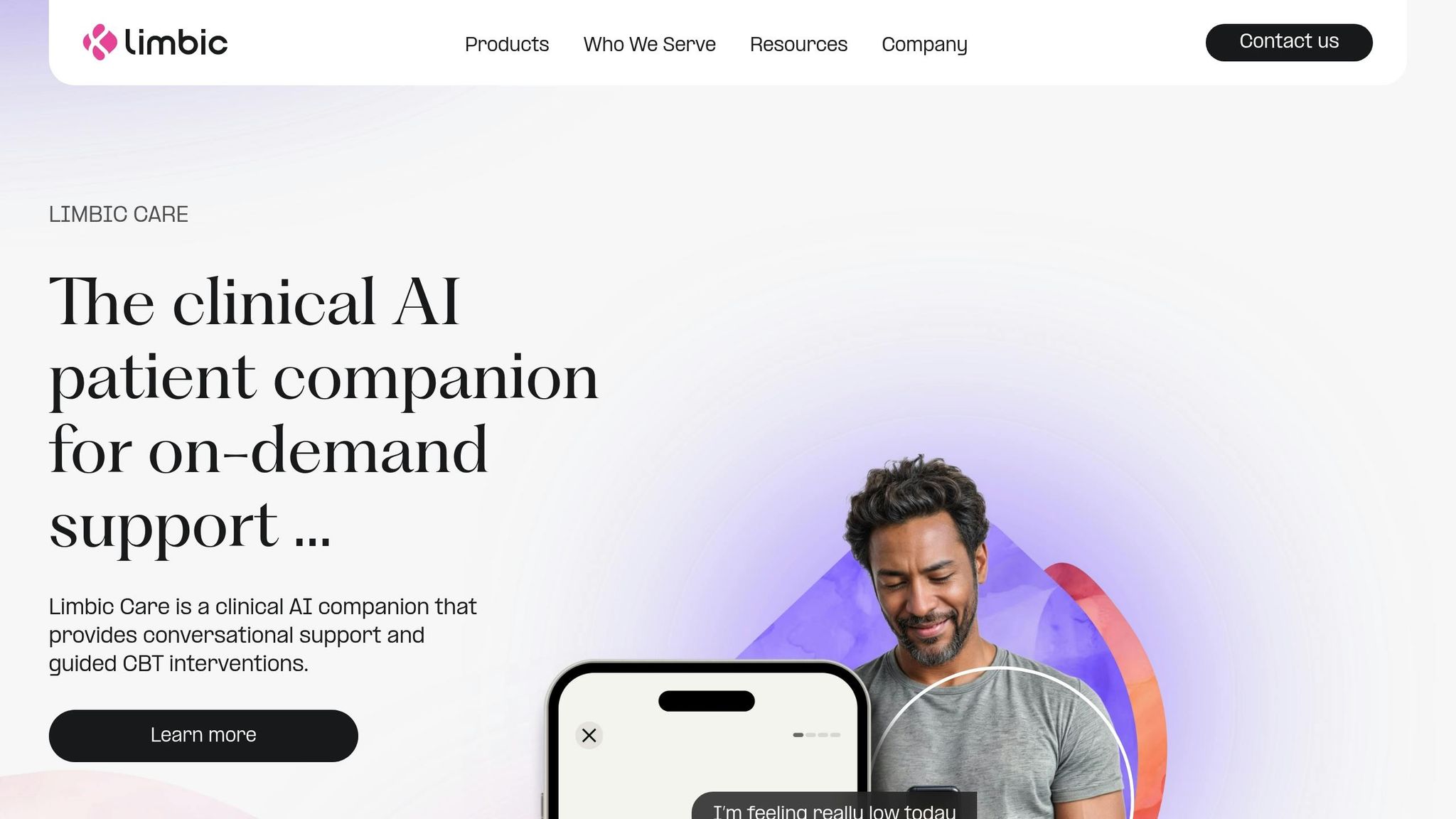
Limbic Care is a European AI platform that supports therapy while addressing the stigma around mental health treatment. A 2025 study across five NHS Talking Therapies services in England found that patients using Limbic Care had a 42% increase in session attendance, a 23% decrease in dropout rates, and a 25% improvement in recovery rates.
Ross Harper, CEO of Limbic, highlighted the platform's potential:
"Demonstrating that GenAI can safely and effectively augment real-world mental healthcare across multiple diagnoses within an established national health system represents a major step forward in AI-assisted therapy. This isn't about naive substitution, this research shows that AI can amplify the work of clinicians treating patients right now. It provides hope for our overburdened care systems through fundamental change within existing clinical structures."
Limbic Access, an associated tool, acts as a digital gateway to care and has supported over 280,000 users. Costs range from $4.55 to $7.15 per unit, and it integrates seamlessly with patient management systems.
Pros: Proven results in clinical settings, available 24/7, reduces stigma, and works within existing healthcare systems.
Cons: Primarily available in Europe, may require adaptation for U.S. healthcare systems, and not widely available for individual users.
Dialzara
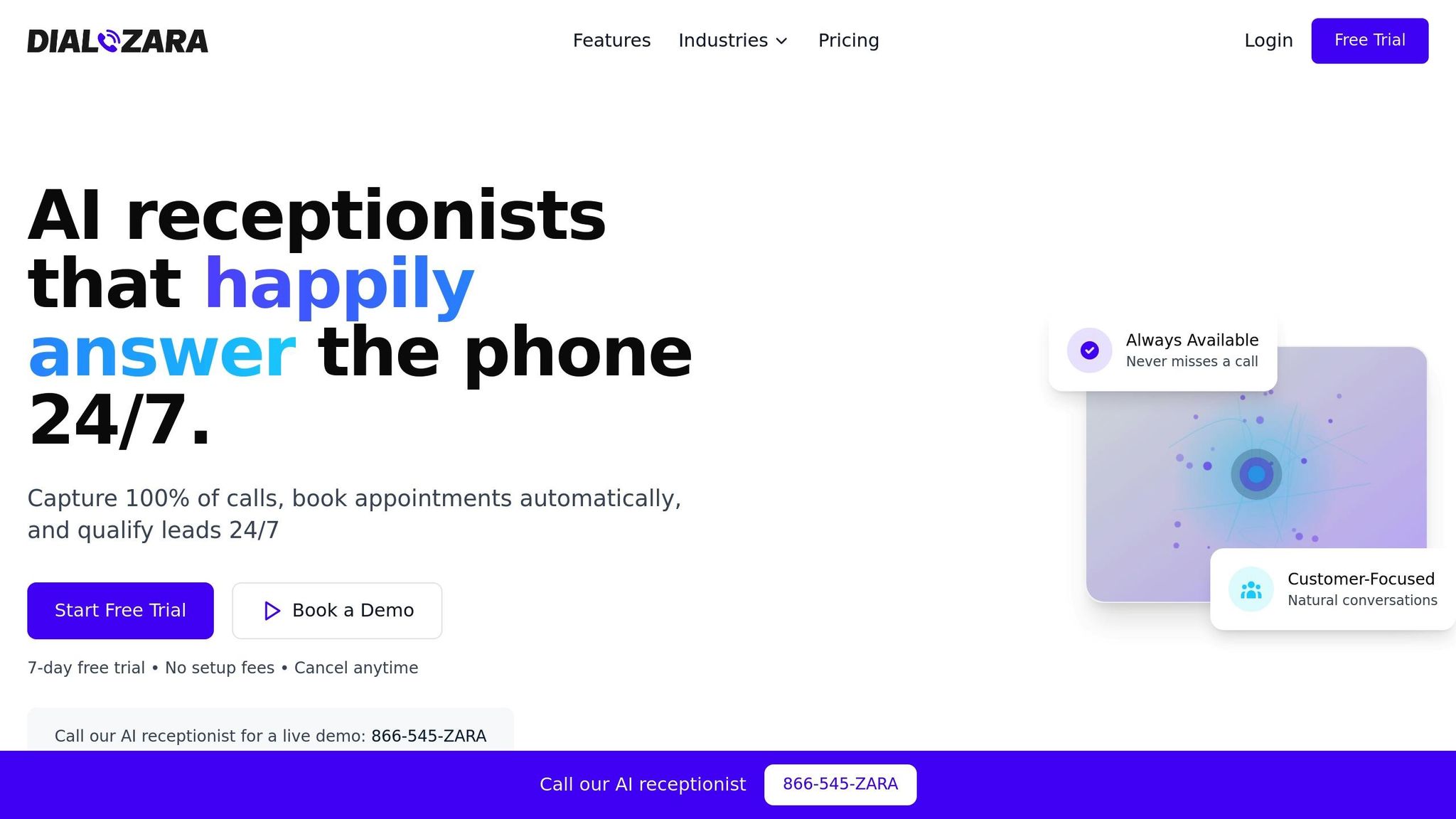
Dialzara is designed to support mental health providers by automating administrative tasks, ensuring therapists can focus more on patient care. This AI-powered virtual assistant handles call answering, appointment scheduling, and client intake, addressing a critical need as over half of U.S. psychologists reported no openings for new patients in 2024.
The platform integrates with over 5,000 business tools and can cut administrative costs by up to 90%. It manages high call volumes efficiently while maintaining quality, adapting to industry-specific terminology and mimicking the practice's communication style. By taking over these operational burdens, Dialzara helps practices prioritize patient care.
Pros: Reduces costs, lightens the administrative load on therapists, integrates with existing systems, and offers quick setup.
Cons: Requires initial setup and training, may involve an adjustment period for staff and patients, and is limited to administrative functions rather than therapeutic services.
How to Choose the Right AI Mental Health Tool
Finding the right AI mental health tool means carefully considering factors that directly impact its effectiveness and usability. Here's what to keep in mind as you evaluate your options.
Clinical Validation and Safety
The first thing to check is whether the tool has been thoroughly tested in clinical settings. Clinical validation ensures the tool meets high standards for accuracy, reliability, and safety. Without this, it's hard to trust its effectiveness.
Look for tools backed by published clinical studies or peer-reviewed research. Resources like READI, the APA checklist, and Accept-AI can help you assess the quality of AI mental health chatbots. As John Torous, MD, MBI, advises:
"If unsure, it is best to assume 'no' until proven otherwise, as there is clear evidence that some AI chatbots can cause harm, and the evidence of their benefits is mixed and still evolving." – John Torous, MD, MBI
Privacy and Data Protection
Your mental health data is extremely sensitive, so the tool you choose must prioritize privacy. Ensure it complies with HIPAA and other relevant regulations. Take the time to review the platform's privacy policies, including how it handles your data, where it’s stored, and whether it’s shared with third parties.
Transparency and Explainability
A trustworthy AI tool should be transparent about how it works. Look for platforms that clearly explain how their algorithms make decisions, what data they were trained on, and any known limitations. Avoid tools that operate as mysterious "black boxes."
Accessibility and Inclusivity
Accessibility is key to ensuring everyone can use the tool effectively. Look for features like:
- Compatibility with screen readers
- Multilingual support
- Customizable interfaces
- Options for interacting via text, voice, or video
These features make the tool more inclusive and usable for a broader range of individuals.
Level of Human Support
Decide if you need a tool that combines AI with human assistance or one that’s entirely AI-driven. While AI can handle mild to moderate concerns, more complex mental health needs often require the involvement of human professionals. Choose a platform that aligns with the level of support you or your patients require.
sbb-itb-ef0082b
Tool Comparison Chart
Here’s a quick summary of the top AI mental health tools for 2025, comparing their features side by side for easy reference.
Primary Tools
| Tool | Monthly Price | Annual Price | Clinical Validation | Support Type | Highlights |
|---|---|---|---|---|---|
| Wysa | $19.99 | $99.99 | ✓ Yes | AI + Human Therapists | FDA Breakthrough Device Designation, 5M+ users in 90+ countries, AI Award recipient |
| Talkspace | Varies | Varies | – | Human Therapists + AI | Licensed therapists, insurance coverage, text/video sessions |
| Dialzara | Varies | Varies | Healthcare compliant | AI Phone Support | 24/7 availability, HIPAA compliant, appointment booking, crisis call handling |
Additional Tools for Context
| Tool | Monthly Price | Annual Price | Clinical Validation | Support Type | Highlights |
|---|---|---|---|---|---|
| Headspace | $12.99 | $69.99 | Limited | Self-Help + AI | Meditation focus, AI mental health companion, sleep stories |
| Calm | $14.99 | $69.99 | Limited | Self-Help | Sleep stories, relaxation focus, AI-curated content |
| ChatGPT | Free / $20 | $240 | ✗ No | General AI | Emotional support conversations, not specifically for mental health |
| Yuna | $8.99 | $69.99 | Limited | AI Self-Therapy | Voice-first interface, real-time reflections, privacy-focused |
| Sonia | $39.99 | $199.99 | Limited | AI Anxiety Support | 6-week structured program with voice and text support |
Key Insights from the Comparison
This chart highlights important differences in pricing, clinical validation, and types of support offered. For instance, ChatGPT provides the most budget-friendly option with free access, while Sonia is the priciest at $39.99 per month. Wysa stands out for its extensive reach, with over 5 million users in 90+ countries, and accolades like the FDA Breakthrough Device Designation and a UK-based AI Award as of March 2025.
Support models vary widely. Some platforms, like Wysa, blend AI-driven support with access to human therapists, offering a hybrid approach. Others, such as Dialzara, cater specifically to healthcare providers, offering AI phone support with features like HIPAA compliance and crisis management. On the other hand, tools like Headspace and Calm focus on self-help, emphasizing relaxation and mindfulness.
The growing popularity of AI in mental health care reflects a shift toward more accessible and diverse support options. Each of these tools serves distinct needs, whether it’s administrative efficiency, structured therapy programs, or general emotional support.
Conclusion
By 2025, AI has dramatically reshaped mental health support, offering new ways to tackle America's growing mental health challenges. Building on earlier progress in patient care and administrative processes, these advancements have opened doors to more accessible and efficient mental health services.
AI tools now deliver precise, 24/7 support for early intervention and ongoing care. However, their role is not to replace human professionals but to enhance their work. From assisting with session notes to offering tailored resources and easing administrative burdens, AI helps mental health professionals focus on what matters most - providing care - while upholding ethical and confidentiality standards.
The hybrid model of AI efficiency paired with human empathy is emerging as the cornerstone of future mental healthcare. Platforms like Wysa combine AI-driven interactions with access to human therapists, while tools like Dialzara streamline tasks like managing crisis calls and administrative workflows. This approach is especially critical, given that more than half of US psychologists were unable to accept new patients in 2024.
AI's real-world impact is already evident. For example, NHS Talking Therapy services have reduced patient wait times by integrating AI, a success that has led to broader adoption across multiple providers. But achieving these results requires more than just advanced technology - it demands seamless integration into existing systems, robust data privacy measures, and comprehensive training for staff.
For AI to truly succeed in mental health care, transparency around data storage and access is essential, as is ongoing monitoring of AI tools by practitioners. While AI can enhance accessibility and efficiency, it cannot replicate the emotional connection and empathy unique to human therapists. By blending AI's strengths with the irreplaceable human touch, the mental health field can create a more inclusive and effective support system, reaching more people than ever before.
FAQs
How do AI tools protect privacy and keep mental health data secure?
AI tools take privacy and security seriously when it comes to mental health support. They rely on advanced measures like encryption, access controls, and strict adherence to healthcare regulations such as HIPAA. These measures are designed to keep sensitive patient information safe from breaches or unauthorized access.
Many platforms also use technologies that identify and protect sensitive data, including Personally Identifiable Information (PII) and Protected Health Information (PHI). By blending strong data protection strategies with regulatory compliance, these tools work to safeguard trust and confidentiality in mental health services.
What should I consider when deciding between AI-only mental health tools and those that include human therapist support?
When choosing between AI-driven mental health tools and those that include support from human therapists, it’s essential to consider your specific needs and goals. AI tools are great for offering immediate, round-the-clock assistance with things like managing emotions, learning stress reduction techniques, and gaining psychoeducational insights. However, they fall short when it comes to offering the deep empathy and nuanced understanding that human therapists provide, especially for complex emotional challenges or trauma-related issues.
For many, a combination of both options can be the most effective approach. AI tools can handle basic support tasks and conduct initial assessments, leaving human therapists to focus on building deeper connections and addressing more sensitive or intricate topics. It's also important to think about ethical and safety considerations. AI tools may not be well-suited to manage high-risk situations, like suicidal thoughts, as effectively as a trained professional. Ultimately, choose solutions that match your personal mental health needs and prioritize safety in critical moments.
How are AI tools like Wysa and Talkspace transforming mental health care by integrating with healthcare systems?
AI tools like Wysa and Talkspace are transforming mental health care by making it more accessible and tailored to individual needs. Take Wysa, for instance - it offers tools to help patients manage their symptoms while also providing clinicians with insights to better personalize treatment plans. On the other hand, Talkspace has teamed up with services such as Amazon Pharmacy, simplifying access to psychiatric care and necessary medications.
These kinds of integrations go beyond just convenience. They cut down on administrative tasks, improve how care is coordinated, and ensure patients get support that’s specifically suited to them. By connecting patients and providers more effectively, AI tools are reshaping mental health care into a system that works smarter and serves people better.
Summarize with AI
Related Posts
AI Mental Health Chatbots: Addressing Therapist Shortage
Explore how AI chatbots address the therapist shortage by providing accessible mental health support 24/7. Learn about the benefits, concerns, and implementation strategies in this informative article.
AI Chatbots for Dementia Patients: Benefits
AI chatbots are revolutionizing dementia care by providing memory support, emotional companionship, and relieving caregiver stress.
Top 7 AI Companions for Seniors in 2025
Explore the top AI companions revolutionizing senior care in 2025, enhancing emotional support, health monitoring, and daily engagement.
AI in Healthcare: Improving Patient Communication
Explore how AI enhances patient communication in healthcare by simplifying medical jargon, providing 24/7 support, and personalizing interactions.
